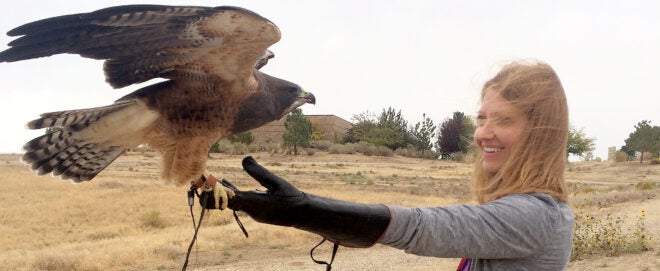
Amanda Hoffman is the Manager, Morley Nelson Snake River Birds of Prey National Conservation Area. She earned her Bachelor of Political Science and Master of Public Policy and Administration degrees from Boise State.
“I Can’t Believe I Get Paid to Do This”
For someone who considers herself a bureaucrat, Amanda Hoffman’s career has included a lot of excitement. “I wish I’d kept a list,” she said. Her “once-in-a-lifetime experiences” include fire monitoring in a helicopter, cave swallow netting in the Carlsbad Caverns, fish tagging, working with bald eagles and other educational raptors, presenting to delegates from Uganda, hiking to The Wave and horseback riding to remote areas of Grand Staircase-Escalante National Monument.
But what she loves most about public service is the opportunity to improve quality of life by providing services important to public health and to the environment.
In fact, Hoffman started thinking about public service at an early age. “I decided I wanted to be a Federal employee when I was 8 years old,” she said. “I was part of a children’s choir that performed in Washington D.C. and I decided it was where important things happened.”
“I’m not an -ologist”
Hoffman admits to being “somewhat of an anomaly” at the Bureau of Land Management, where most land managers come from a physical science rather than a social science background. “I’m not a biologist, ecologist, or geologist,” she said.
But rather than holding her back, Hoffman said her studies have given her a certain advantage in her career, particularly when it comes to understanding people with differing viewpoints. Maintaining that people skills are just as important to successfully managing public land as understanding the physical component, she credits her Political Science degree with helping her build listening and communication skills, and her MPA with helping her gain an understanding of policies, processes, politics and people.
As an example, Hoffman cites a book she was introduced to at Boise State. Policy Paradox: The Art of Political Decision Making discusses the intertwining of policy analysis and policy making and how politics can’t be removed from either. “I’ve thought about it often over the years. I think it improved my ability to present my ideas, listen to others, and develop strategies to obtain support. Those skills have been invaluable.”
Hoffman recognizes Leslie Alm, her Boise State undergraduate and graduate advisor, as being “the reason I am where I am today.” She also said Dr. John Freemuth’s insights into the mechanics of environmental administration and policy helped her see a place for herself in public land management.
But Hoffman’s learning experiences at Boise State extended well beyond the traditional classroom. In addition to analyzing data about juror experiences through an internship with the District of Idaho Federal Court, Hoffman took an independent study course with Dr. Gary Moncrief that looked at the impacts of term limits in Oregon. She credits this course with strengthening her statistical and technical writing skills – skills that ultimately led to her landing her first job with the BLM.
“Network, Network, Network”
Hoffman encourages current undergraduate and graduate students to reach out to people who are already working in the fields they are interested in and to take advantage of every learning experience they can. Especially ones that build connections with professors and other students.
“The relationships you develop have just as much influence on your success as anything else,” she said. “People aren’t successful alone.”